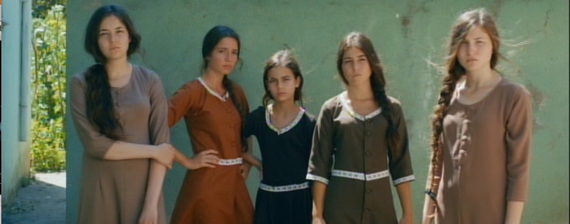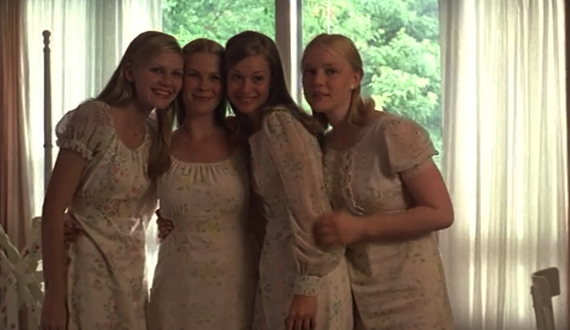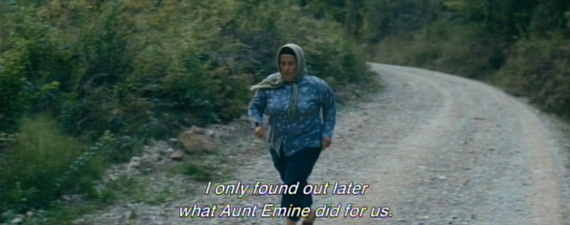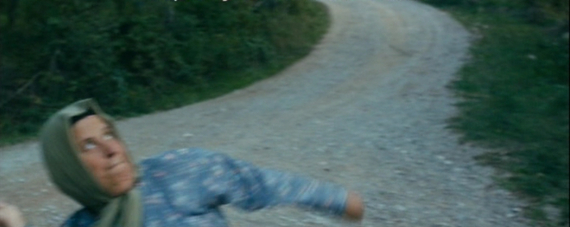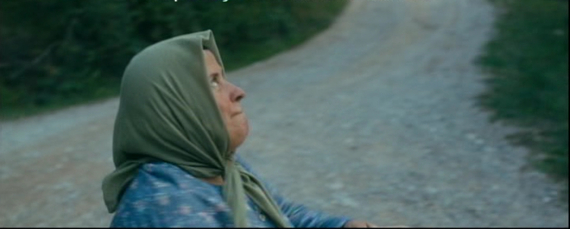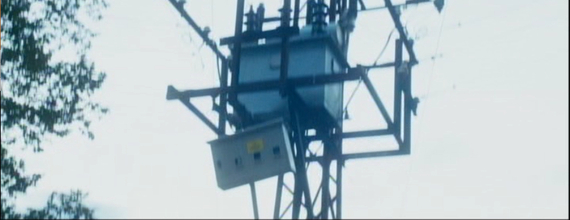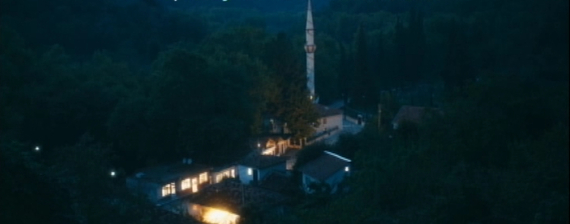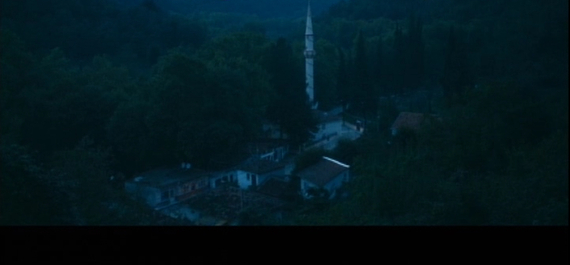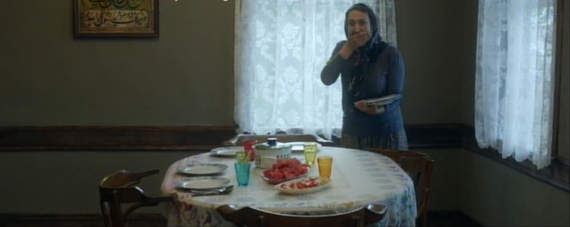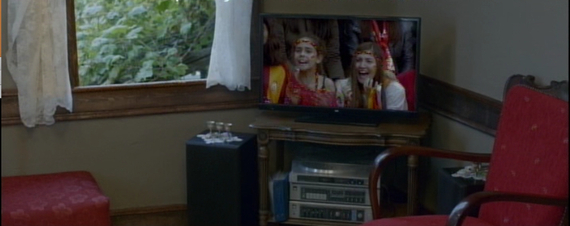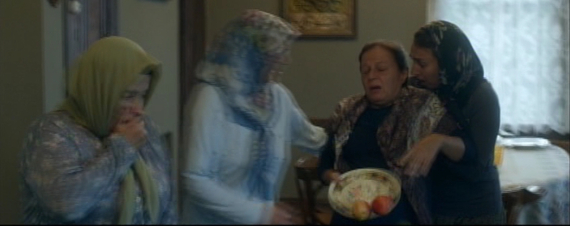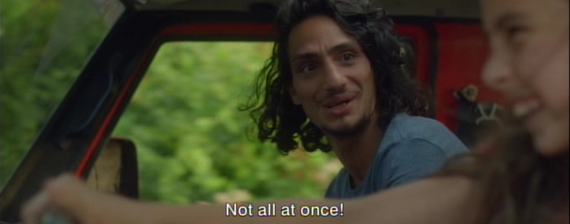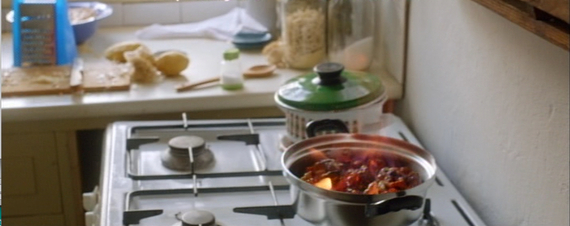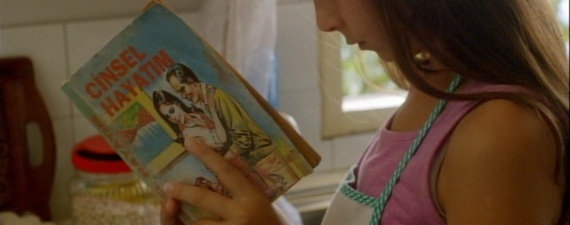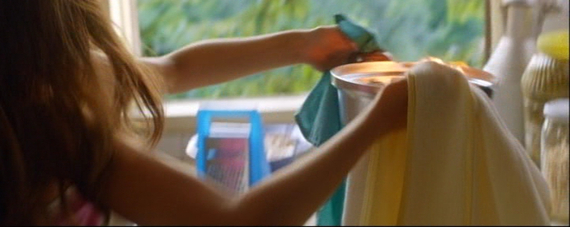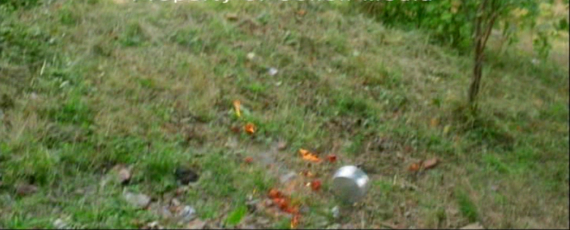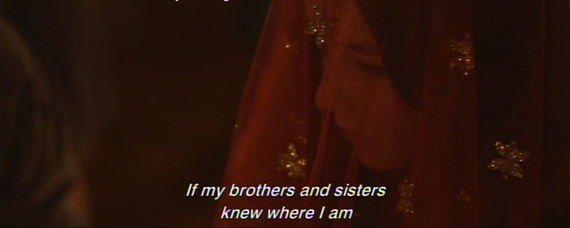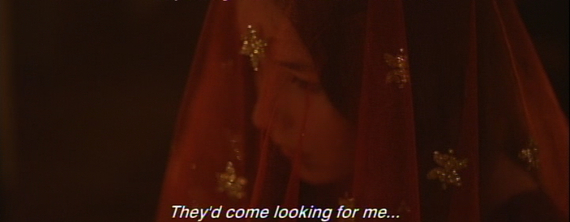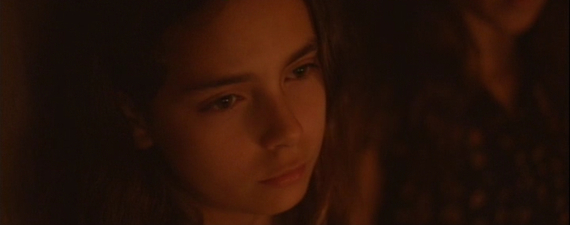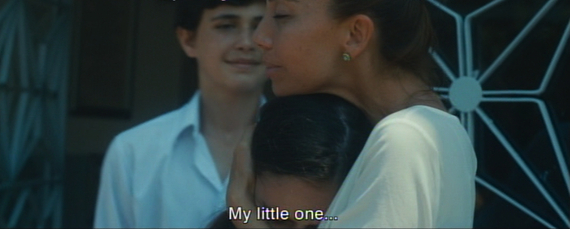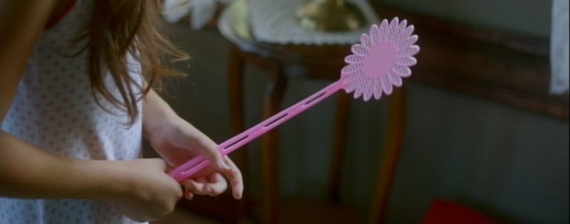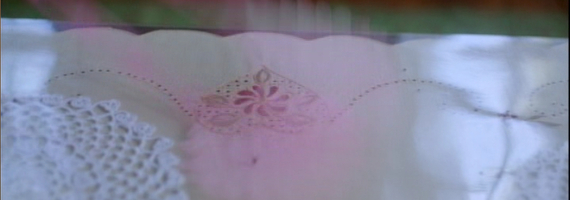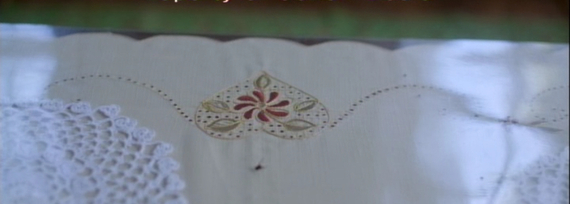Advancing the, well, universal right of self-determination, Mustang explodes yet another cinema-kernel of Hegelian popcorn.
Simply put, from its opening-sequence-as-storyline-encapsulation, comprised of alarm bells over a black screen (ostensibly signaling the end of school, whilst also lending itself as signifier of far graver events to come) followed by the opening shot of a teacher, Dilek (Bahar Karimoglu) embracing her young, crying pupil Lale (Gunes Sensoy), (who is desperate not to part with the most significant example of correct adulthood in her particular universe), through stories of ultimate loss and revolutionary gain, to its final, guaranteed-to-make-your-eyes-well-up-with-sorrow-and-joy scene of another embrace after an at-times dark journey, this is, to my feeble mind, the Oscar-winner for Best Foreign Film.
Notes on trailer: I would advise in earnest that you skip the trailer -- with its possibly deceptive overall upbeat-ness, misleading sync of a gunshot and its arguably Virgin Suicides-redux font and (marketing) cool-conferring sugary-haze shoegaze songbyte (from Ghostel's "Buckley Get Your Gun" in which you hear the word "suicide") -- and just see the movie. At the press conference for Carol, I actually had to explain to a few folks I see at these events and who mentioned to me that the trailer for Mustang left them uninterested, why they should see this film.
By way of a quick cliché intro in order to dispense with same: etymologically, "Mustang" is also a fun title to contemplate, dually addressing the captive situation of its protagonists and also their resistance to said captivity -- to wit: "mustang" (per my Apple Dictionary version 2.1.3) derives from 1) mestengo, from mesta, meaning "company of graziers" -- a grazier being a person who raises, shepherds, fattens "cattle or sheep for market", and 2) mostrenco, meaning "wild or masterless cattle."
Of course, one can only discuss etymology for so long, ditto the considerable well, consideration given by many to similarities twixt this film and The Virgin Suicides.
Deniz Gamze Ergüven photographed on a Canon 1DX by Michael Vazquez c. 2015 ALL RIGHTS RESERVED
Seasoned through a year's worth of festival queries, director Deniz Gamze Ergüven has understandably downplayed the relationship of The Virgin Suicides to her work -- though she notes that she'd read the book and seen the movie, as it were -- regularly citing during interviews the greater impact on Mustang from other influences, and in largely formalistic considerations, comparing Mustang "structurally to Escape From Alcatraz and films in which the house is a character".
Requiring neither the director's nor a reviewer's opinions, one reasonably discerns that Mustang, though obviously not wholly birthed from The Virgin Suicides (book nor film) is not quite a parthenogenesis, either. At the end of the day, the amplitude of and differences between both films render quite starkly the considerable finitude of the comparison between two simply dynamite, very different works, and begs the rhetorical question: So what of the similarities? The voltas of the creative act remain one of life's great rewards, and ultimately, simply put, there is categorically no comparison that could diminish the particular accomplishments of this very cool movie, the performances, the originality of its story, and its likely immeasurable impact, beyond Turkey and France, and beyond awards season.
The real question -- by way of a jumping forward in the plot -- is: in a design challenge pitting Mrs. Lisbon's homecoming dresses in The Virgin Suicides versus the Grandmother's lemonade-in-the-town-square dresses in Mustang, who wins?***
Returning to our film, by way of a synopsis, though you are likely already familiar with the plot: Mustang is the story of five orphaned sisters being raised by their uncle and grandmother, both of whom, concerned with their reputation in their small Turkish village, set about circumscribing the sisters' existences en toto, removing them from school, reducing their lives to domestic imprisonment pending quickly-arranged marriages, after a town moralist and gossip de-athleticized and salaciously re-rendered the nature of the water-game known as a "chicken fight", by literalizing and localizing its mechanics through the prism of her worldview, which was then reinforced by their grandmother who, when told of the game by her granddaughters attempting to rationally counter the accusation, declares there's no such game, going sorta Kathy Bates à la the whole foosball-hatin' thing in The Waterboy, except this isn't a comedy.
The grandma and aunts, the "graziers" in this film, are dharmically portrayed by Nihal Koldas, Emine Aynur Konecoglu and Hanife Suzanne Marrot, exhibiting a behavioral triptych ranging from an dishearteningly unquestioning existence, through ambivalence of, and over their complicity in the total subjugation of females in perpetuation of the soul-offending conditions under which they came of age, through to heroic acts of ultimately unshakable solidarity (albeit, within their conditioned self-circumscription).
The uncle, Erol, is played by Ayberk Pekcan, a marquee stage and film actor whose so-good-it's-easy-to-take-for-granted inhabitation of an (ostensibly benign) tyrant everyman (not every man) domesticus tyrannos masculus makes you wonder why the part was turned down by other actors, until you realize, well, reality.
Specifically, as the director explained to me, the first actors to whom she offered Uncle Erol were afraid to put their reputations on the line, having deemed 'The part and the film, too subversive". When I asked Gamze-Ergüven if Pekcan, a big-name actor was taking a risk, she bluntly, emphatically affirmed. Indeed, after the Turkish premiere, in an abhorrent tactic of incitation -- which again, is hardly exclusive to Turkey -- someone posted, alongside a condemnation of the film, the daily whereabouts of the director; her screenings, appearances, etc.
The mostrenco of this film, you already know: trading card-ready sisters Selma (Tugba Sunguroglu), Nur (Doga Doguslu), Ece (Elit Iscan), Sonay (Ilayda Akdogan) and Lale (Gunes Sensoy), the youngest, who, despite -- or indeed, because of her juvenescence -- is the least willing to accept their lot, her lot.
Truly masterless, Lale emerges as a fiery, yet sage agent of liberation, and in a most earnest dedicated feat of existential heroinism -- both onscreen and in real-life, given, again, the present-day societal "norms" against which the dignity of her performance revolts -- she becomes her sister's keeper, delivering what in trad lingo is rightly called a tour-de-force, meriting a look through prior lists of foreign actor Oscar nominations, youngest actor, Oscar nominations, etc.
In consideration of the above, by way of an additional factor which might appropriately be thrown into the mix -- only with great care, and only after a movie rocks one's world on its own merits: when one has the rare opportunity to dually and rightly consider the world-swirl around which a given year in cinema orbits, and to recognize a work truly of our times, a work -- and again, this is of infinitely greater importance -- delivered with very damn good storytelling and acting -- in a word, first-rate, and in this case, universally accessible -- cinematic art, Mustang seems also the best film of the year, and a film that just also happens to be, well, important.
And lest we delude ourselves about our own society not perpetuating similar, if not identical subjugation of women -- indeed, perhaps no society on this planet can claim that they are exempt from at least some, if not all of the very significant repressive elements devised in this truly global film -- we need only look at our own issues, from equal pay through some "communities'" troubling treatment of women and denial of essential rights, to sex-slavery and labor-trafficking. The moral themes and questions raised about our very existence transcend the particulars of the plot, and again, are also very certainly not exclusive to Turkey.
One noteworthy depiction of bedrock solidarity from female elders -- who also at times, as the director noted during a press conference, mystifyingly betray the younger generation -- occurs within a terrific sequence delivering pure hilarity, and yet also a unambiguous metaphor quite, ahem, powerfully, when Auntie Em (short for "Emine" though perhaps also a Wizard of Oz reference, since Mustang also has a pair of red shoes, a journey, and arguably a kind of scarecrow character in a salt-of-the-earth delivery -- and deliverance -- dude who represents what's best in humanity) steadfastly, tenaciously throws rocks at an electrical transformer, ultimately downing the hardware and denying power and light to the entire town.
Downing the hardware...
Simply put, the shot of a lone, courageous individual taking out the lights of a town reminds one of, well, the value of cinema. And lest one think -- given the tragic image of a woman in a headscarf dominating the news -- that this culling of images of a headscarved woman creating (albeit, infinitely less tragic) havoc is insensitive, I would posit the fact that on this planet hundreds of millions of women wear their hair this way daily, in keeping with their belief system (and this includes many Jews and Christians); to edit, censor one's work would indeed be the more insensitive methodology, furthering an irrational kerchief-fear (though I have my own very strong personal opinions on each religion's views of women) and possibly even the beyond-moronic presumption that what can be said of one can be said of all.
The inter-cutting of the aunt's inspired vandalism with shots of the sisters whom, having snuck out of the house, are enjoying their selves at a soccer match -- the verboden event and television broadcast of their appearance at same comprising the reason why Grandma fainted and auntie pre-empted the evening's viewing for the entire town, lest her nieces face the uncle's wrath -- had each of the three audiences I've seen Mustang with laughing, and doing so with some emotional joy, and I'm glad I got to see the soccer game scene on the big screen. And again, given the times, being reminded of the joy of mass gathering is now a unanticipated, small, yet very healthy encouragement within this film.
Interestingly, while re-watching the stadium scene on DVD, the extent to which I became aware of the filming process, rather than -- or perhaps in addition to -- inhibiting suspension of disbelief, instead or also seemed to switch the film over to documentary-mode, adding to its value and impact. By this I mean to say that in Mustang's art imitating life, and encouraging changes in same, simply by its courageous example of being produced, there is unique engagé value.
In another feat of heroinism of the non-comedic variety, we ken the tragic determinism circumscribing the generational consciousness of the female elders, and its impact on their supervision of these five girls, each of whom, through varying degrees of separation, render most -- though, importantly, not all, (and by "importantly", I mean to emphasize the different personas of the sisters, not ascribe a valuation pro nor con to any given tradition) -- of their elders' presumptions obsolete, when we also see the grandmother, visibly panicked, frantically organizing a wedding trunk, rushing her third grand-daughter off towards a arranged marriage, making as light as she can the fact that her reluctant, forced bride is only fourteen.
Nervously short of breath, she explains that she herself got married equally young, and "Under similar circumstances."
Given the preceding scene in which she confronts her son about sexually abusing his nieces (a scene which, like many, Lale remains on the periphery of, coming into the room at just the right time to appear to have been out of earshot) we understand, in this courageous yet still shockingly tolerant admonishment by the grandmother, the hellish constraints she -- amidst many multiple generations of women, far beyond the borders of Turkey -- accepted in life, making all the more heroic (since it's also culled from real-life) this film's instances of women of the older gen acting on their best moral sensibilities, and rendering equally heartbreaking when they again, albeit, within their conditioned self-circumscription, fail to protect the natural development of female citizens, especially given the perils and harms the young women increasingly face and suffer through, in advancing towards a common-sense present-gen self-reclamation, after substantive, grim loss.
Returning to our movie, as Lale registers the growing struggles, points of tension and scarcity of time, she learns to drive, thanks to the aforementioned Scarecrow-figure, a delivery truck driver she befriends when he gives her a ride home after talking her out of an early, ill-planned runaway. Like the director, he is a dual-citizen of sorts, in this case German and Turkish.
The element perhaps most eminently informing and also momentously advancing Mustang's plot is the cumulative effect of a series of first-rate conveyances of Lale's inner monologue and ongoing calculus, punctuating the beguiling ensemble performances, and delivering a classic youngest-sister-as-gadfly, with total character ownership through equally laudable depictions of the character's acting-out in keeping with her age, vamping around in a too-big bra filched from her sister's wardrobe, insisting that her protesting grandmother let her breathe, and giggling when her seriously pissed-off older sister takes her to task and clobbers her for wearin' her stuff; or as a moral force of nature, insisting on driving lessons from a kind stranger; and possessed of a business-like stealth whilst sagely casing the parameters and exit options of and from their gated house, and locked-down existence.
Counting down her sisters' marriages -- one to a passionate first-love; the other as consolation prize for the dude initially allotted ("allotted" seems the right word) to the aforementioned sister -- Lale (as is her wont) effortlessly flits out of a room when her Grandmother, busy preparing Lale's reluctant sister for a forced marriage, reminds Lale that she too, will be fitted for a wedding dress this day.
As we chart Lale's sane progression, though we know we are well towards fight-or-flight, writer and director manage to surprise most of us (present company included) with the timing of her procession towards a destiny, which I leave for you, dear reader and movie-lover, to discover.
Random notes
Extra-credit reading: A few years ago, I wrote: "Women are coming into their own in Turkey", in my review of the dynamite Turkish film Araf, which was in my top five list of films of the year.
In addition to the screen presences, performances and of course story, additionally and simply, in its most basic examination, Mustang is well and truly possessed of a near-unceasing cinematic-data-viz-richness, foretelling and codifying much of this story through shot-composition (two quick examples: when you see this film, check out the black collar around the uncle's white shirt, and also the blue window framing the sister who invites a young man to join her in a car, and a similar framing of the uncle the night before). Herewith some additional (highly subjective) visual notes, none of which presume to definitively connote, well, the connotations; these are merely a few of the many additional and worthwhile elements for each viewer to discern and enjoy on her or his own.
The ember of the wedding...Lale, cooking while reading a book (My Sex Life) throws a frying pan -- note the red and gold, and their circumscribed isolation from the green in photo above -- out the window and it lands on grass; this shot is immediately followed by a red scarf with golden spots similar to the dish thrown out the window, perhaps symbolizing a possible escape from the wedding veil.
Apple, too...In one of the only perhaps tired references in this film, an apple is plucked and there's a garden expulsion of sorts...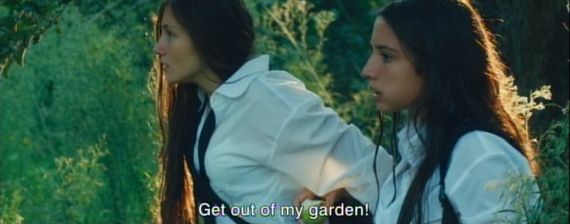
Flower-power...note the flower haloing (or perhaps furnishing angelic or fairy wings for) the reassuring teacher; Lale hunts a fly with a pink flower-shaped fly swatter, eventually killing it dead, its corpse seen at the base of an embroidered heart.
Additional random Notes
While many are touting the Amy Winehouse doc, Amy as a strong contender for this year's Oscar for best documentary -- and make no mistake, it's a fine doc, though I think The Wolf Pack was oddly snubbed -- I simply don't know how Joshua Oppenheimer's The Look of Silence, which sequels his The Act of Killing (which was robbed two years ago) couldn't be considered the most rewarding and significant documentary accomplishment of the year. Simply put, the social engineering skills and courage, alongside the genuine mastery of vision that makes this film as engaging to watch as it is inherently interesting, place this one in a class by itself for 2105, and within a noble tradition of work along the subversive (of the subject, not the audience) lines of The Laughing Man or the dharmic dedication of a Patricio Guzman whose work was recent re-released by the folks at Icarus Films.
Whilst taking a break from Hulu's dynamite selection of films from the mighty Criterion label, I watched the worthwhile Amy Winehouse: A Final Goodbye before I'd heard of the new doc, Amy, and after seeing the latter, which though more cleanly produced, I didn't find enough difference to make Amy Oscar-worthy.
Indeed while Amy's greatest strength is the self-indictments of its subjects -- Amy's father, the media, et., al., -- I daresay Oppenheimer's civil, forensic infiltration and full-on subversion of mass murderers points the way for a Hegelian advancement of a country, its people, and hopefully a new generation of filmmakers who need to move beyond the sadly formulaic docs that are becoming far too common.
Mr. Oppenheimer, whatever happens at the Oscars, you, Adi Rukun, and your anonymous colleagues are first-rate existential heroes and you've changed the future. Thank you.
I didn't receive the link to Deniz Gamze Ergüven's first film, A Drop of Water, in time for this posting, however, it may presently be even more relevant, in its depiction of a young woman named, well, Lale (played by Ergüven herself) who is equally a part of two very different cultures. I'll post the link when I get it.
A boxed set of the soundtrack for The Virgin Suicides was recently re-issued; more info can be found HERE.
The folks at MOMA are ending the year with a dynamite retro of Antonio Pietrangelli. On 12/18, the final day of the series, they'll be screening I Knew Her Well which I'm guessing a lot of young women making their way in this damn city would find interesting, if dark. Think of it as a grim Breakfast At Tiffany's, and don't miss it. Those not in NYC can get the DVD when it comes out, HERE.




